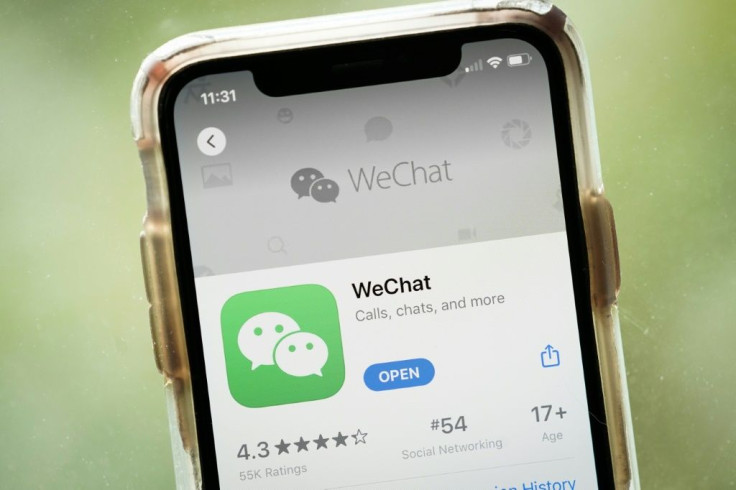Trump’s Ban On WeChat Would Hurt US Companies In China If Broadly Applied, Survey Says

KEY POINTS
- U.S. companies said that Trump’s order would lead to decrease in competitiveness and also hurt revenues
- WeChat has more than 1.2 billion users around the world
- U.S. firms in China generally use WeChat to communicate with employees and local government officials
President Donald Trump’s ban on Chinese-owned messaging app WeChat would hurt U.S. companies operating in China, according to a survey by a U.S. business group.
Earlier this month, the Trump Administration said by mid-September it would prohibit U.S. companies from conducting certain transactions with WeChat and its parent corporation, Tencent Holdings, due to data security concerns. (The White House did not specifically delineate what kinds of transactions would fall under the order)
But the American Chamber of Commerce in Shanghai, or AmCham Shanghai, found in a survey released Wednesday that U.S. companies said that Trump’s executive order prohibiting WeChat would lead to a decrease in their competitiveness and also hurt their revenues – especially if the ban were applied to U.S. companies and U.S. citizens in China.
The impact would be less severe if the order was limited to transactions in the U.S., the survey found.
Tencent recently said that WeChat – the dominant messaging and social media platform in mainland China – has more than 1.2 billion users around the world. WeChat Pay serves as a key primary mobile payment platform.
U.S. firms in China generally use WeChat to communicate with employees and local government officials, as well as a marketing tool.
One company that participated in the survey told AmCham Shanghai: “WeChat is an essential communication tool we rely on to conduct business in China and outside of China. The inability to use WeChat would significantly hamper our ability [to] operate in China and with Chinese individuals and Chinese companies outside of China. The ban on WeChat is counterproductive and should be reconsidered.”
Another company implored: “Do not ban WeChat. It is a valuable tool for American companies doing business in China. … If WeChat has or is doing anything illegal in the U.S. then take appropriate action in that jurisdiction but do not ban American citizens from choosing to use the application.”
Representing 1,400 member companies, AmCham Shanghai said while it “supports the U.S. government’s efforts to protect the data of U.S. citizens and the need for reciprocity in the U.S.-China trade relationship, we are concerned that an overly broad implementation of the [executive order] could have a devastating impact on American companies in China.”
Ker Gibbs, the president of AmCham Shanghai, told the Wall Street Journal: “Customers who use WeChat will be reluctant to switch platforms and likely abandon U.S. products for their Chinese, European and other competitors.”
Trump’s executive order stated that WeChat “automatically captures vast swaths of information from its users. This data collection threatens to allow the Chinese Communist Party access to Americans’ personal and proprietary information.”
The order further warned that WeChat “censors content that the Chinese Communist Party deems politically sensitive and may also be used for disinformation campaigns that benefit the Chinese Communist Party.”
In a public statement on Trump’s executive order, Tencent said it is “reviewing the potential consequences of the executive order to develop a fuller understanding of its impact. ... The company will make further announcements as and when appropriate.”
A ban on WeChat could also harm Hollywood’s links to China.
“Every American who does business in China is about to wonder how they are going to be in touch with people in China,” a talent manager told the Los Angeles Times. “I don’t have phone numbers. I don’t have email addresses. I just have WeChat – that’s the norm.”
© Copyright IBTimes 2025. All rights reserved.





















